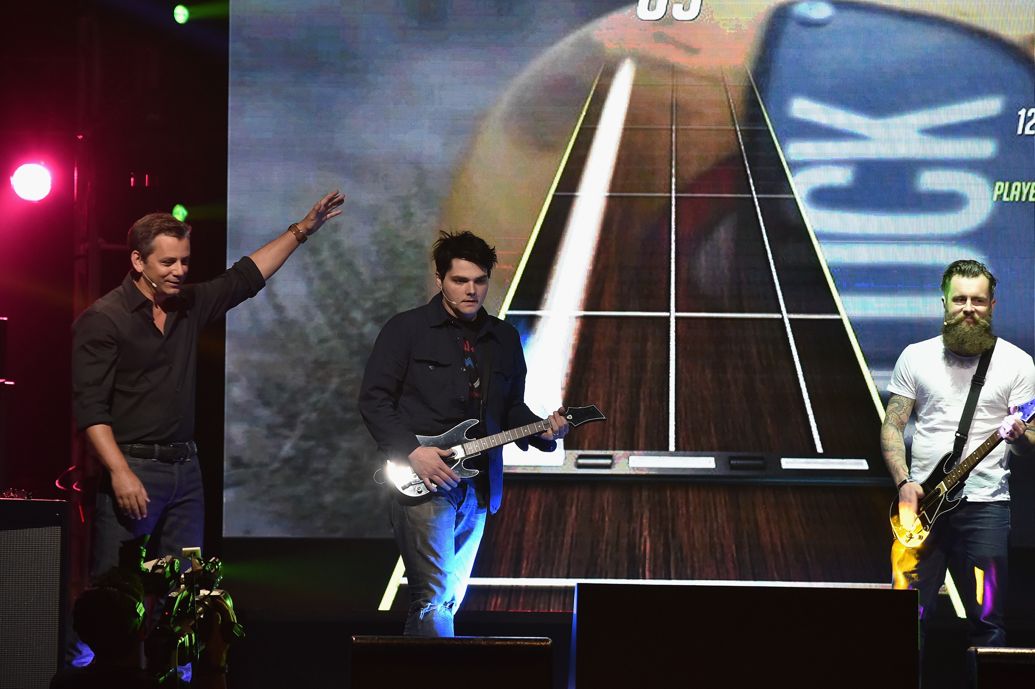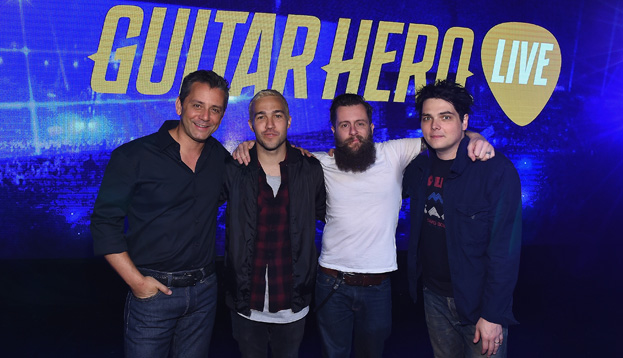Eric Hirshberg was at the Best Buy Theater in New York City’s Times Square to introduce press to Guitar Hero Live, the first new game in the franchise in five years. He had some help from Fall Out Boy’s Pete Wentz and My Chemical Romance’s Gerard Way to show off the new guitar controller and the first-person perspective gameplay, as well as the music video discovery mode, Guitar Hero TV.
Having sold over 30 million copies during its first run at retail, Activision enlisted FreeStyle Games to develop a new game and allowed them time to experiment. This fall the new game will ship across all consoles, as well as mobile. While it will face competition (again) from a new Rock Band game, the current music and video game landscape is very different. The original Guitar Hero predates Facebook, Twitter and Spotify, and eSports wasn’t a global phenomenon back in 2005. Hirshberg explains why Activision, which has had success in eSports with Call of Duty, is looking at the pro gaming angle for Guitar Hero Live in this exclusive interview.
Five years ago when we last saw Guitar Hero at retail, professional gaming wasn’t as popular as it is today. What opportunities do you see for Guitar Hero Live given the rise of eSports like Call of Duty Championship?
Certainly if you go back and you look at the subculture that popped up around this game online on YouTube and the amazing athleticism almost of the best players out there, it lends itself to that kind of competition very well. It’s not integral to our plans today, but it’s something that I think you might see.
Coming out of the 2015 Call of Duty Championship, what are your thoughts on just how things have grown in the eSports space over the past five years?
It’s incredibly powerful and it speaks to a couple things. We look at it mostly as a way to drive engagement. We look at it as an incredible expression of engagement and passion from our fans that the game is played competitively, and these teams are just unbelievable. I used to think I was a really good gamer until I came to Activision and then I immedicable went down a few rungs on the latter with developers like David Vonderhaar and Jay Puryear that are unbelievable players that can kick everyone’s ass internally. Then you look at the teams that are playing on the stage and they’re at a whole different level. It really is like professional sports. It’s talent and it’s work and there’s a reason why these guys are the best, so the potential for Guitar Hero to plug into that is obvious, and one world we’ll watch and think about carefully.
Speaking of professionals, what’s the reaction been like from musicians you’ve contacted to be involved in Guitar Hero Live?
In a weird way pop culture is cooperating with Guitar Hero a little bit more right now because there’s a lot more music right now that’s at the top of the charts that is guitar-based than the last time. There are big bands like Fall Out Boy and The Black Keys, and they have big hits and they’re wildly popular. And there are also a lot of bands in the whole folk rock movement like Mumford & Sons, Of Monsters and Men and The Lumineers that’s very guitar-based. On one hand those bands fit really well into Guitar Hero, but the other thing we wanted to do differently this time is we widen the aperture of what kind of music could be in a Guitar Hero game.
How are you expanding the music offerings in this game?
Guitar Hero always had a heavy emphasis on one genre, and that genre guitar rock, will certainly be well represented in this game if you’re a fan of that. But when you look at the way people consume music today, they don’t just listen to one genre. They listen to multiple genres, and the game is based on these fictitious music festivals. If you look at the modern music festivals there are hip hop acts, pop acts, folk acts, rock acts, country acts, and EDM all occupying the same stage and playing to the same audience. That’s how people think about music these days. If it’s a great song and people like listening to it and it’s fun to play, we think they’ll love playing it in Guitar Hero. We’ve taken a little bit more of a wide net approach to the genres that you’ll find in the game, and I think the artists have been very excited about that.
 Guitar Hero Live; Photo Credit: Larry Busacca, WireImage for Activision
Guitar Hero Live; Photo Credit: Larry Busacca, WireImage for Activision
Over the years many rock stars have told me they’re great, obviously, at playing real guitar but they suck at Guitar Hero. What does it say about this game that Gerard Way from My Chemical Romance beat Jamie Jackson, the developer of the game, on stage?
If you have the muscle memory of what you would really do with a real guitar, it’s hard to break that and map your brain to a whole new way of pressing your fingers against the strings, so to speak. But both Gerard Way and Pete Wentz bucked that trend. We gave them the game before this event and let them practice a bit and they both took it pretty seriously knowing they’re going to be playing publically. It’s also a good sign that the new button configuration just feels right. One of the things Jamie (Jackson) talked about was that everyone who’s picked up the new three-over-three six button configuration just plays better instantly. It does feel more intuitive and natural. Your fingers just feel like they go there in a way that feels superior to the previous games.

